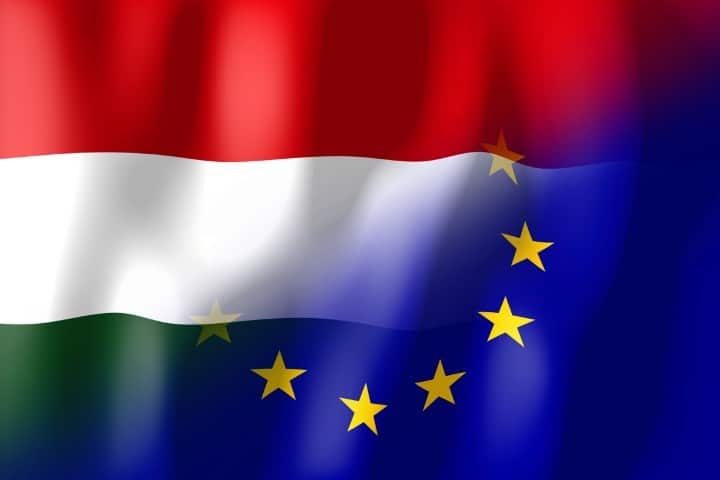
On November 7, European Commissioner for Budget and Administration Johannes Hahn accused the conservative government of Hungary of not abiding by a series of prerequisites that would enable it to obtain frozen EU funds, saying that “the ball is very much in Hungary’s court.”
In statements made to the members of the European Parliament’s budget and budgetary control committees in Brussels, Hahn alleged that the measures taken so far by Hungary “are not enough,” and thus “the budget remains at risk.” He alluded to the “conditionality regulation” that permits the EU to adopt measures, such as suspending payments, when alleged violations of the EU rule-of-law principles undermine EU financial interests.
Last December, the European Commission decided to withhold 22 billion euros of EU cohesion funds for Hungary until its government meets leftist EU conditions on LGBT ideology, the asylum system, and supposed academic freedom. The EU is also withdrawing 5.8 billion euros in grants from Hungary from the bloc’s post-Covid stimulus program until Budapest tackles EU concerns over the independence of courts. December also saw the European Commission declare that the European Union’s Erasmus grant-funding program, which permits students to study abroad at partner institutions, would no longer apply for 21 Hungarian universities.
Although the Hungarian parliament adopted a law in May to meet EU requirements to bolster judicial independence in the country, Brussels contends that Budapest has not done enough.
Budapest has argued that the real reason for these EU moves is political and based on the government’s conservative positions on issues such as migration, the transgender debate, and the conflict in Ukraine.
Hungarian Foreign Minister Péter Szijjártó said:
Something always comes up. There’s always something more. It is clear that those commissioners who constantly express new doubts about Hungary’s commitment always make new demands, they are simply biased against us for political reasons. And they are withholding our EU funds completely unfairly, without any legal basis or good reason.
Hungarian Minister for Regional Development Tibor Navracsics had previously said he hoped talks with the EU to release the funds meant for Hungary would conclude by the end of November this year.
Media reports hinted that the EU would give the greenlight in exchange for the Budapest government’s support for more aid to Ukraine, including a start to membership negotiations for Kyiv.
Hahn did mention “constructive meetings” with his Hungarian counterparts, and rebuffed the concerns of some members of the European Parliament (MEPs) that Hungary was using its leverage to “blackmail” the EU.
One of these MEPs, Moritz Körner of the German liberal party FDP, proclaimed at the committee meeting that the EU must not “give in to threats” from Hungarian Prime Minister Viktor Orbán and that the money to Hungary “should not be released until all the necessary requirements have been fulfilled.” The MEP even recommended giving funds directly to Hungarian NGOs, without going through the Hungarian government.
Körner’s ideas were echoed by Gwendoline Delbos-Corfield, a French Green MEP and the Parliament’s Hungary rapporteur, who told Politico that the EU should give funds for Hungarian universities and research, but in a way that the money does not “fall into the hands of a corrupt regime.”
Additionally, European Commissioner for Jobs and Social Rights Nicolas Schmit lamented that, although “we all regret” that “Hungarian people are the ones being punished,” it would be challenging to circumvent Orbán’s government regarding EU funds.
Andor Deli, Hungarian MEP for the ruling governing party Fidesz, slammed the commission for making additional demands on Hungary every time the left-liberal majority of the European Parliament pressures Budapest. “I urge the Commission to not give in to blackmail. We need to avoid the politicization of this procedure,” he said.
Bogdan Rzońca, MEP for the conservative Polish PiS party, complained that, as long as there is a leftist majority in the EU, the bloc will be biased against conservative governments. Rzońca exemplified how the EU ignored the rule-of-law breaches and jeopardizing of the independent judicial system by the leftist Spanish government.
Meanwhile, Values and Transparency Commissioner Věra Jourová disclosed in a recent interview with Politico released on November 9 that the contentious requirement for NGOs to disclose third-country funding will remain in the EU’s own upcoming “foreign agents act,” known as the Defense of Democracy Package.
The package is supposedly meant to regulate the transparency of political advertising by monitoring the funding of European political parties and foundations to eradicate Russian and Chinese influence. Effectively, if passed as law, the package would set up a public registry and compel all NGOs in the EU to disclose their foreign funding, regardless of the origins of such funding.
At first, many European and global NGOs backed the package, with 14 major organizations championing it in a joint letter. However, these supporters became worried as time revealed that they, too, would have to abide by the same transparency rules as those suspected to have the backing of EU adversaries such as Russia and China.
In May, over 230 national and international organizations signed another joint letter petitioning the commission to ditch or amend its plans, citing fears of potential “abuse” from some governments.
As expected, many U.S.-backed leftist groups featured heavily among the signatories, including organizations such as Transparency International, Human Rights Watch, Democracy International, and George Soros’ Open Society Foundations.
These groups highlighted Hungary and its conservative government, which allegedly introduced “discriminatory, unjustified, and unnecessary” restrictions on civil society. Also, the groups contended that proposed transparency measures would “open the space for abuse and discriminatory restrictions on civil society” and even “foster a climate of distrust in the work of [NGOs].”
Not surprisingly, these groups omitted the fact that several U.S.-backed NGOs injected millions of dollars into the left-wing opposition’s campaign during the last Hungarian elections, a classic example of the kind of foreign meddling that the proposed law was meant to forestall.
Should these leftist groups be forced to disclose their finances, European governments could classify these NGOs as political advertisers, hampering their ability to further their agendas.
If these leftist actors were indeed sincere about upholding the integrity of European elections, as the commission has constantly claimed, then the package should be welcomed regardless of whether Beijing, Moscow, or Washington is bankrolling these groups.
The incessant lobbying from leftists seems to have made some political inroads, with Commissioner Jourová stating that the present version of the package had some leeway for preferential treatment in certain cases.
Those NGOs that would experience “a justified risk” of repercussions in certain member states, the commissioner declared, could request to be classified under a “nonpublic part of the register.” With the official proposal still in the works, the phrase “nonpublic part of the register” remains ambiguous. What is more, it is pointless to have a nonpublic registry if the primary aim of the package is to facilitate transparency and the integrity of European elections.
Shop For Night Vision | See more…
Shop For Survival Gear | See more…
-
Sale!

Tactical Camo Nylon Body Armor Hunting Vest With Pouch
Original price was: $49.99.$39.99Current price is: $39.99. Select options This product has multiple variants. The options may be chosen on the product page -
Sale!

Japanese 6 inch Double Edged Hand Pull Saw
Original price was: $19.99.$9.99Current price is: $9.99. Add to cart



















































